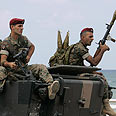
IDF changes approach to Lebanon army
Following last week's deadly exchange of fire on northern border, IDF says incident was just straw that broke camel's back after series of aggressions, orders forces to respond firmly to any violation of calm by 'treacherous' Lebanese army
Exactly a week after the exchange of fire on Israel's northern border, the IDF decided to change its approach to the Lebanese army. After the incident, Yossi Heiman, head of the Division for Strategic Planning and Foreign Relations in the Planning Directorate, told the Lebanese chief of staff as well as senior UNIFIL figures that Israel would now respond harshly to all aggressive moves – four times more severely than it had done before the incident.
Until the incident, soldiers on the other side of the fence were considered to be contributing to stability together with UNIFIL (United Nations Interim Force in Lebanon). During previous years, IDF soldiers have operated near the international border ("the blue line") a very short distance from the Lebanese soldiers and never felt threatened. In fact, there was even a certain level of trust between the armies, which sometimes met under UNIFIL auspices.
Despite the state of war between the countries, the IDF would hold regular meetings with senior Lebanese officers via UNIFIL. Now, however, the IDF is accusing the Lebanese army of "treachery" and saying that the recent incident, which led to changes in operational procedures, was just the straw that broke the camel's back after a series of aggressive incidents.
The IDF warned it has now permitted soldiers operating the environs of the border to respond more forcefully to any incident. However, the IDF also noted that the change in approach was temporary, to be in place only until Israel is convinced that the Lebanese soldiers do not pose a threat to the IDF.
Lebanese army understood message
The message did not fall on deaf ears, and no other unusual incidents have been noted at the northern border since last week's incident in which the quiet was disturbed by soldiers of the Lebanese army's ninth brigade – who are known for being more extreme in their behavior.
The IDF is paying close attention not only to the Lebanese army but also to its links with Hezbollah. The Northern Command is prepared for a scenario in which Lebanese forces are influenced by Hezbollah or even assist it. If such a scenario comes about, the IDF will hold the Lebanese government directly responsible and will take harsh measures against the army and its infrastructure.
The US House Foreign Affairs Committee announced Monday the cessation of security aid to Lebanon, saying Hezbollah's involvement in Lebanese army operations must be investigated.
In response, a senior Lebanese figure said Lebanon had tried to calm US fears that US weapons were reaching terror organizations.
Meanwhile, the IDF continues to keep watch on Hezbollah activities and those of its leader, Hassan Nasrallah. His announcements on Monday regarding Israel's alleged involvement in the killing of former Lebanese Prime Minister Rafiq al-Harari were rejected by the IDF.
The IDF believes that the Hezbollah secretary-general has been under strong pressure recently, particularly as an international commission is investigating al-Harari's murder and may connect the organization to the murder.
Lieutenant Colonel Dov Harari was killed in last week's exchange of fire and Captain Ezra Lakia (res.) was wounded.
As the northern border returns to its previous quiet, reserve soldiers who were called up to give support are being recalled.
- Follow Ynetnews on Facebook










